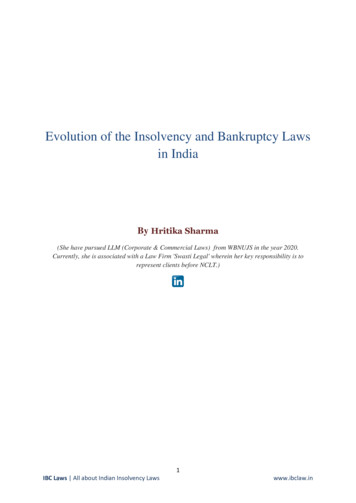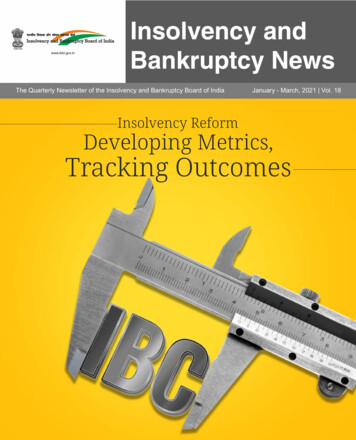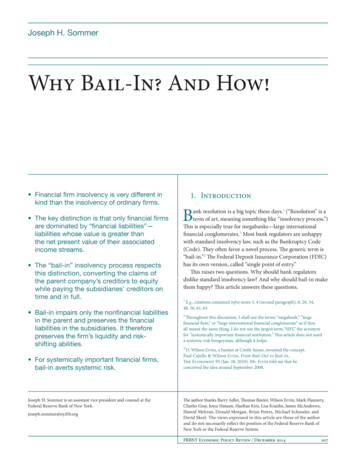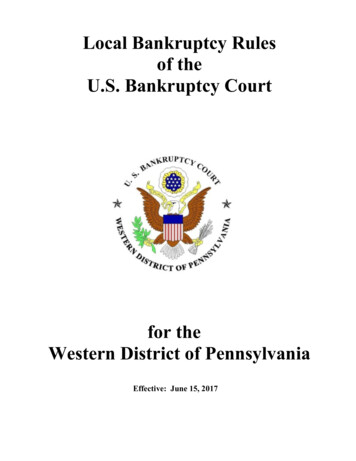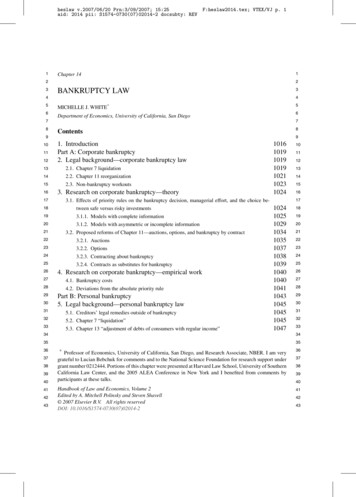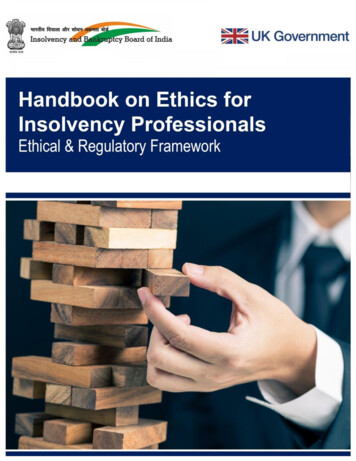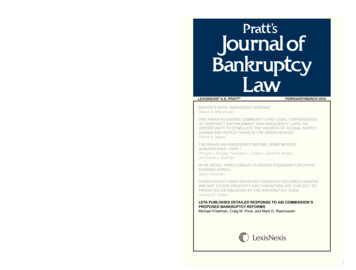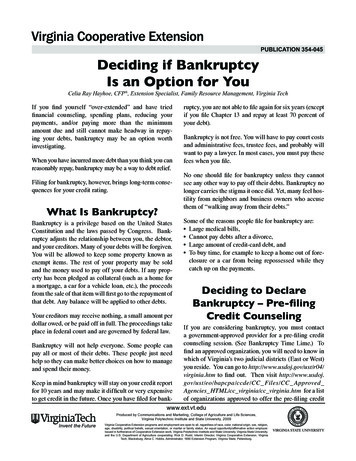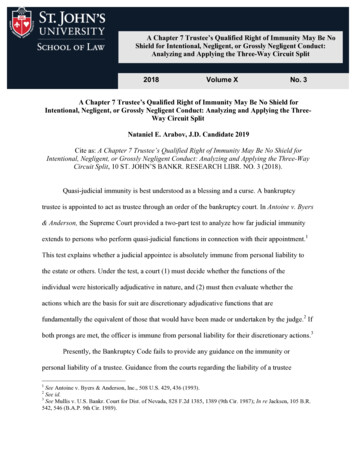
Transcription
LAWS OF SAINT VINCENT AND THE GRENADINES ·REVISED EDITIONBANKRUPTCY AND INSOLVENCY ACTCHAPTER136Act No.43 of2007Printed and published with the authority of theGovernment of Saint Vincent and the Grenadines[Issue 1/2009)
CAP.136Bankruptcy and Insolvency ActCHAPTER136\BANKRUPTCY AND INSOLVENCY ACTARRANGEMENT OF SECTIONSPART IPreliminarySECTION1.Short title and commencement.2.Interpretation.PART IIActs of Bankruptcy3.Acts of bankruptcy.PART IIIReceiving Orders, Interim Receivers, Secured Creditors and Receivers4.5.6.7.8.9.10.Petition for Receiving OrderFiling of petition.Petition against estate of deceased.Costs of petitioner.Appointment of Interim ReceiverAppointment of interim receiver.Appointment of interim receiver where section 12 notice pending.Appointment of interim receiver where notice of intention or proposal filed.Costs of interim receiver.Secured Creditors and Receivers11.12.13.14.15.16.17.Who may be a receiver.Secured party to provide notice.Duties of receiver.Required action by receiver.Rights of receiver.Duties of debtor.Receiver to provide notice of disposition.18.Personal liability of receiver.I 9.20.21.22.23.Court order in respect of non-performance of duties.Court may order statement of accounts to be submitted for review.Receiver may apply to Court for directions.Certain provisions of Companies Act to apply where debtor is a company.Priorities of distribution in a receivership.3[Issue 1/2009)
CAP.136Bankruptcy and Insolvency ActPART IVAssignmentsSECTION24.Who may make an 3.34.35.36.37.38.39.40.41.42.43.44.45.46.4 7.48.49.50.Who may make a proposal.Filing of proof of secured claim.Where secured creditors may not vote.Secured claims upon bankruptcy.Notice of intention.Trustee to assist in preparation of proposal.Meeting of creditors.Adjournment of meeting.Proven creditors may vote prior to meeting.Creditors may accept or refuse proposal.Proposal may include terms of supervision.Creditors may appoint inspectors.Effect of refusal of proposal by creditors.Substitution of trustee by Court order.Trustee to apply to Court for approval of proposal.Trustee to prepare report to Court.Payment of preferred claims and trustee's costs.Where proposal approved by Court made by bankrupt.Trustee to file proposal with Supervisor.Default in performance of proposal.Court may annul the proposal.Date of assignment where Court approval not obtained.Court to value claims where creditor participation required.Agreements not to be terminated or altered.Certificate of performance.Mutatis mutandis provision.PART VIProperty of the Bankrupt51.52.53.Property of a bankrupt.Excess income of individual bankrupts to be as prescribed.Where assignment of certain payments ineffectual.54.55.Stay of ProceedingsStay of proceedings upon filing of notice of intention or proposal.Stay of proceedings upon bankrupt.[Issue 1/2009)4
CAP.136Bankruptcy and Insolvency ActSECTION56. Aggrieved creditor may apply to Court for removal of stay.57. Stay ineffectual against certain parties and claims.58.59.60.61.62.63.64.65.66.67.68.General ProvisionsPrecedence of bankruptcy over certain creditors unless process completed.Property of bankrupt to vest in trustee.Trustee to avail himself of other rights.Delivery of seized property to trustee.Trustee may surrender lease or deal with lease-hold interests.Receiving order and assignment may be registered.Effect of bankruptcy on property in certain cases.Transactions valid unless prior registration.Where contributory indebted to bankrupt.Banker to advise trustee of existence of account.Trustee may inspect property.69.Where trustee disposes property subject to an encumbrance.70.71.72.73.74.75.Persons claiming ownership interest in property of the bankrupt.Unpaid suppliers may prove for certain goods.Claim of farmer or fisherman.Sale of patented articles by trustee.Copyright works dealt with by bankrupt.Bankrupt's interest vests in purchaser upon sale by trustee.Partnership Property76.Partnerships.Crown .91.Crown claims are unsecured.Crown's security to be registered to be enforceable.Settlements and PreferencesSettlements within one year void.Contracts in consideration of marriage.Payments void subject to proof of certain facts.Assignment of book debts void.Preferences voidable ifmade within three months.Preference to related party voidable if made within twelve months.Transactions between initial bankruptcy event and bankruptcy.Proceeds from dealing with property obtained in void or voidable transaction.Good faith transactions with bankrupts protected.Reviewable transactions in year prior to initial bankruptcy event.Where dividend paid by company.Mutatis mutandis.Where proposal followed by bankruptcy.5[Issue I /2009)
CAP.136Bankruptcy and Insolvency ActPART VIIAdministration of EstatesMeetings of CreditorsSECTION92.93.Trustee to send notice to creditors of first meeting.Trustee may call meeting.94.Notice regarding subsequent meetings.Procedure at Meetings95.Chairman of first meeting.96.Quorum at meetings.97.Creditors may vote by class.98.99.I 00.101.102.103.l 04.Chairman may admit or reject proofs.Completed proof of claim required to enable voting.Voting where claims acquired.Where non-bankrupt parties jointly liable.Secured creditor may vote unsecured portion only.Where trustee may vote.Minutes to be proof of meeting.105.Creditors vote by dollar.Inspectorsl 06.Appointment of inspectors.l 07.Trustee may call meeting of inspectors.l 08.l 09.110.Trustee to call meeting to appoint inspectors.Directions of creditors to override directions by inspectors.Miscellaneous provisions relating to inspectors.111.Claims provable.112.113.Where bankruptcy follows proposal.Proof in respect of distinct contracts.114.Proof of claim required to share in distribution.115.116.Court may disallow false claims.Proven creditors may examine proofs of claim.117.118.119.Secured creditor may prove for balance due.Trustee may require proof of claim by secured creditor.Trustee may require security to be sold.Claims ProvableProof of ClaimsProof by Secured Creditors120.Secured creditor may require election of trustee.12 l.Amended claim where security realised.[Issue l /2009]6
CAP.136Bankruptcy and Insolvency ActSECTION122.123.124.Amendment of claim where security not realised.Exclusion of secured creditor from dividend.No creditor to receive more than one hundred cents on dollar.125.Admission and Disal/owance of Proofs of Claim and Proofs of SecurityTrustee to examine proofs.126.127.Scheme of DistributionPreferred creditors.Where reviewable transaction.128.Claim of relative of bankrupt.129.130.131.132.133.134.135.136.Claim of participating lender.Claim of officer and director.Dividends pro rata.Property of bankrupt partnership.Where surplus remains after claims paid.Final surplus to bankrupt.Motor vehicle insurance.Supervisor's rs to declare dividends to ordinary unsecured creditors.Thirty day notice to prove claims.Where claim proven after dividend declared.Final statement ofreceipts and disbursements to be prepared.Final statement to be complete account.Dividends on joint and separate properties.Unclaimed dividends and undistributed funds.144.145.146.Summary AdministrationProvisions applying to summary administration.Remuneration in summary administration.Mutatis mutandis.PART VIIJBankruptsCounselling Services147.Trustee to counsel individual bankrupts.Duties of Bankrupts148.149.150.Duties of bankrupts.Bankrupt corporation.Imprisoned bankrupt.7[Issue 112009]
CAP.136Bankruptcy and Insolvency ActExamination of Bankrupts and OthersSECTION151. Examination of bankrupt by Supervisor.152. Investigation by Supervisor regarding bankrupt.153. Trustee may examine bankrupt and others.154. Trustee may require delivery of property of bankrupt and production of books and records.155. Where person may be ordered by Court to pay trustee.156. Issue of warrant for apprehension and examination of persons.157. Examination by Court.158.Arrest of BankruptsCourt order for arrest of 69.170.171.172.173.Discharge of BankruptsAutomatic discharge of first time individual bankrupt.Bankruptcy of an individual operates as an application for discharge.Trustee to prepare report of application of bankrupt for discharge.Trustee's report to provide recommendation.Powers of Court in relation to discharge.Facts relevant to discharge.Value of bankrupt's assets.Cessation of any statutory disqualification.Bankrupt to report to trustee and Court.Court may consider effects of settlement before marriage.Debts not released by order of discharge.Third parties not released.Court may annul discharge.Court may annul bankruptcy.Issuance of orders to be delayed.PART IXAdministrationSupervisor174.175.176.Appointment of Supervisor.Access to trustee's accounts.Suspected offences.177.Maintenance of public records.Public RecordsTrustees178.179.Licensing of TrusteesApplications for licence as trustee.Form of licence.[Issue 1/2009]8
CAP.136Bankruptcy and Insolvency ActSECTION180. Payment offees.181.182.183.184.Conduct of TrusteesTrustee prohibited from acting in specified circumstances.Independent legal opinion.Code of ethics.Cancelled nt and Substitution of TrusteesAppointment or Substitution of trustee by creditors.Rights of Supervisor where questionable trustee conduct.Notice to trustee.Protection of estate by Supervisor.Court removal of trustee.Appointment by Supervisor of non-licensed trustee.Duty to act.Acts done in good faith.193.194.195.196.Corporations as TrusteesCorporate trustee.Incorporation.Acts by corporate trustee.Corporate trustee not a trust company.197.Official name.198.199.200.20 I.202.203.204.205.206.207.Duties and Powers of TrusteesTrustee to give security.Delivery of property to trustee.Protective measures.Legal proceedings to protect estate.Divesting of real property.Initiation of criminal proceedings.Returns.Regulators empowered to review records.Insure property.Deposits.208.Maintenance of books and records.209.210.211.212.213.Reporting by trustee.Documents to be provided to Supervisor.Report to Supervisor where trustee no longer appointed.Permission to take specified action.Power to make advances, borrow, etc.Official Name9[Issue 1/2009)
CAP.136Bankruptcy and Insolvency ActSECTION214. Trustee not required to operate business.215. Order for sale of assets.216. Application for directions.217. Redirectionofmail.218. Former trustee to pass accounts.219. Application to the Court by aggrieved party.220.Trustee refusing to act.221.Determination of fees.222.223.Discharge of TrusteeProperty incapable of realisation.Trustee to apply for discharge.Remuneration of TrusteePARTXCourts and ProcedureJurisdiction of Courts224.225.226.227.228.229.230.23 l.232.233.234.235.Jurisdiction of High Court.Title of insolvency matters.General power of Court.Proceeding not invalidated by defect or irregularity.Court may review, rescind, or vary order.Court may give leave to omit material or to send notices in alternative manner.Seizure of property of bankrupt.Evidence in Court.Orders subject to appeal.Costs are in the discretion of the Court.Application to Court where default.Trustee not personally liable.PART XIInternational retation.Copy of order to be proof of events.Stay of proceedings not to apply unless proceedings taken in Saint Vincent and the Grenadines.Foreign representative take certain proceedings.Court may seek aid of foreign authority.Court order may be conditional on compliance of foreign representative with other Courtorder.Foreign representative not prevented from proceeding due to appeal.Dividends subject to property the creditor may acquire outside Saint Vincent and theGrenadines.[Issue l/2009]10
CAP.136Bankruptcy and Insolvency ActSECTION244. Claim payable in foreign currency.PART .257.258.259.260.OffencesOffences committed by bankrupt.Offences committed by undischarged bankrupt.Where debtor having previously taken bankruptcy protection and not keeping properbooks.False claims, unlawful fees and unlawful transactions offences by trustee and others.Offences by trustee and others.Removal of property.Invalid trustee licence.Trustee acting outside authority.Offence committed by corporation.Court may make order for community service.Variation of order made under section 254.Court may make an order regarding damages.Trustee to report to Court.Trustee to report criminal acts.Substance of offence sufficient.Time for commencement of action.PART er respecting bankruptcy rut es.Gazette or local newspaper to be evidence of facts.Admission not admissible under Criminal Code.Acts by corporations, firms and individuals of unsound mind.Vacating of seat in House of Assembly.Leave of the Court required to pursue certain actions.Regulations.Transitional.Repeal.11[Issue 1/2009)
CAP.136Bankruptcy and Insolvency ActCHAPTER136BANKRUPTCY AND INSOLVENCY ACTAn Act to revise the law relating to bankruptcy and insolvency; to make provisionfor corporate and individual insolvency; to provide for the rehabilitation of theinsolvent debtor; to create the office of Supervisor of Insolvency, and for relatedmatters.Be it enacted by the Queen's Most Excellent Majesty, by and with the advice andconsent of the House of Assembly of Saint Vincent and the Grenadines and bythe authority of the same, as follows.[Act No. 43 of2007.][Date of commencement: 31st December, 2007.]PART IPreliminaryI. Short title and commencement(1) This Act may be cited as the Bankruptcy and Insolvency Act, 2007.(2) This Act shall come into operation on a date appointed by the Governor-Generalby Proclamation published in the Gazette.2. Interpretation(1) In this Act-"affidavit" includes statutory declaration and solemn affirmation;"assignment" means an assignment filed with the Supervisor of Insolvency;"attorney-at-law" means a person duly admitted and entitled to practise law inSaint Vincent and the Grenadines;"bank" means every bank to which the Banking Act applies;[Chapter 87.]"bankrupt" means a person who has made an assignment, or against whom areceiving order has been made under section 4(10);"books" and "records" include documents as well as data maintained or processed manually, mechanically, photographically or electronically by any informationstorage device;"claim provable in bankruptcy", "provable claim" or "claim provable"includes any claim or liability provable in proceedings under this Act by a creditor;"corporation" means any incorporated company, wherever or however incorporated, that is authorised to carry on business in Saint Vincent and the Grenadines orthat has an office or property in Saint Vincent and the Grenadines, but does notinclude financial institutions or insurance companies;[Issue 1/2009]12
CAP.136Bankruptcy and Insolvency Act"Court" means the High Court and includes a judge sitting in chambers on matters of bankruptcy;"credit cards" includes debit cards and charge cards;"creditor" means a person having a claim, unsecured, preferred by virtue of priority under section 126 or secured, provable as a claim under this Act;"date of the initial bankruptcy event", in respect of a person, means the earliestof the date of filing of or making of(a)an assignment by or in respect of the person;( b)a proposal by or in respect of the person;(c)a notice of intention by the person;(d)the first petition for a receiving order against the person;"debtor" includes an insolvent person and any person who, at the time an act ofbankruptcy was committed by him, resided or carried on business in Saint Vincentand the Grenadines and, where the context requires, includes a bankrupt;"financial business" means the collection of funds in the form of deposits shares,loans, premiums and the investment of such funds in loans, shares and other securities;"financial institution,, includes any person doing banking business;"goods" includes all chattels personal;"individual" means a natural person;"insolvent person" means a person who is not bankrupt and who resides, carrieson business or has property in Saint Vincent and the Grenadines, whose liabilities tocreditors provable as claims under this Act amount to not less than four thousand dollars, and(a)who is for any reason unable to meet his obligations as they generallybecome due;(b)who has ceased paying his current obligations in the ordinary course ofbusiness as they generally become due; or(c)the aggregate of whose property is not, at a fair valuation, sufficient, or, ifdisposed of at a fairly conducted sale under legal process, would not be sufficient to enable payment of all his obligations due and accruing due;"inspector" means an inspector appointed under section 106;"person" includes a partnership, an unincorporated association, a corporation, aco-operative society or an organisation, the successors of a partnership, association,corporation, society or organisation, and the heirs, executors, liquidators of the suc-cession, administrators or other legal representative of a person;"property" includes money, goods, things in action, land and every description ofproperty, whether real or personal, legal or equitable, and whether situated in SaintVincent and the Grenadines or elsewhere, and includes obligations, easements andevery description of estate, interest and profit, present or future, vested or contingent,in, arising out of or incidental to property;13[Issue 1/2009)
CAP.136Bankruptcy and Insolvency Act"proposal" means a proposal for a composition, for an extension of time, or for ascheme or arrangement;"public utility" includes a person who supplies fuel, water, electricity, telecommunications, or such services as may be prescribed;"receiver" means a person who has been appointed to take, or has taken, possession or control, pursuant to--(a)a security agreement; or(b)an order of a court made under any law that provides for or authorises theappointment of a receiver or receiver-manager,of all or substantially all of-(c)the inventory;(d)the accounts receivable; or(e)the other property,of a debtor that was acquired for, or is used in relation to, a business carried on by thedebtor;"receiving order" means an order of a court made under any law that provides foror authorises the appointment of a receiver or a receiver-manager;"Registrar" means Registrar of the High Court;"resolution" or "ordinary resolution" means a resolution carried by the majorityof votes, and for that purpose the votes of a creditor shall be calculated by countingone vote for each dollar of every claim of the creditor that is not disallowed;"secured creditor'' means a person holding a mortgage, pledge, charge or lien onor against the property of the debtor or any part thereof as security for a debt due oraccruing due to him from the debtor, or a person whose claim is based on, or securedby, a negotiable instrument held as collateral security and on which the debtor is onlyindirectly or secondarily liable;"security agreement" means an agreement under which property becomes subject to a security for the payment of an obligation;"settlement" includes a contract, covenant, conveyance, transfer, gift or designation of beneficiary in an insurance contract, to the extent that the contract, covenant,conveyance, transfer, gift, or designation is gratuitous or made for merely nominalconsideration;"special resolution" means a resolution decided by a majority in number andtwo-thirds in value of the creditors with proven claims present, personally or byproxy, at a meeting of creditors and voting on the resolution;"Supervisor" means the Supervisor of Insolvency appointed under section 174;"trustee" or "licensed trustee" means a person who is licensed or appointedunder this Act.(Issue l/2009)14
CAP.136Bankruptcy and Insolvency Act(2) For the purposes of this Act"related group" means a group of persons each member of which is related toevery other member of the group;"unrelated group" means a group of persons that is not a related group.(3) For the purposes of this Act, "related persons" are persons who are related to eachother if they are(a)individuals connected by blood relationship, marriage or adoption;(b)a corporation and-(c)(i)a person who controls the corporation, if it is controlled by one person,(ii)a person who is a member of a related group that controls the corporation, or(iii)any person connected in the manner set out in paragraph (a) to a person described in subparagraph (i) or (ii); ortwo corporations(i)controlled by the same person or group of persons;(ii)each of which is controlled by one person and the person who controls one of the corporations is related to the person who controls theother corporation;(iii)one of which is controlled by one person and that person is related toany member of a related group that controls the other corporation;(iv)one of which is controlled by one person and that person is related toeach member of an unrelated group that controls the other corporation;(v)one of which is controlled by a related group a member of which isrelated to each member of an unrelated group that controls the othercorporation; or(vi)one of which is controlled by an unrelated group each member ofwhich is related to at least one member of an unrelated group thatcontrols the other corporation.(4) For the purposes of this Act(a)where two corporations are related to the same corporation within themeaning of subsection (3), they shall be deemed to be related to each other;(b)where a related group is in a position to control a corporation, it shall bedeemed to be a related group that controls the corporation whether or not itis part of a larger group by whom the corporation is in fact controlled;(c)a person who has a right under a contract, in equity or otherwise, eitherimmediately or in the future and either absolutely or contingently, to, or toacquire, shares in a corporation, or to control the voting rights in shares of acorporation, shall, except where the contract provides that the right is notexercisable until the death of an individual designated therein, be deemed15[Issue 1/2009]
CAP.136Bankruptcy and Insolvency Act(d)(e)(f)(g)to have the same position in relation to the control of the corporation as ifhe owned the shares;where a person owns shares in two or more corporations, he shall, as ashareholder of one of the corporations, be deemed to be related to himselfas shareholder of each of the other corporations;persons are connected by blood relationship if one is the child, mother,father, brother, sister, aunt, uncle or cousin of the other;persons are connected by marriage if one is married to the other or to aperson who is connected by blood relationship to the other; andpersons are connected by adoption if one has been adopted, either legallyor in fact, as the child of the other or as the child of a person who is connected by blood relationship, otherwise than as a brother or sister, to theother.(5) A person who has entered into a transaction with another person otherwise than atarm's length shall be deemed to have entered into a reviewable transaction.(6) It is a question of fact whether persons not related to one another within themeaning of subsection (3) were at a particular time dealing with each other at arm'slength.(7) Persons related to each other within the meaning of subsection (3) shall bedeemed not to deal with each other at arm's length while so related.PART IIActs of Bankruptcy3. Acts of bankruptcy(I) A debtor commits an act of bankruptcy where the debtor(a)either in Saint Vincent and the Grenadines or elsewhere makes an assignment of his property to a trustee for the benefit of his creditors generally,whether it is an assignment authorised by this Act or not;(b)(c)(d)(e)[Issue l/2009)either in Saint Vincent and the Grenadines or elsewhere makes a fraudulentconveyance, gift, delivery or transfer of his property or of any part of thatproperty;either in Saint Vincent and the Grenadines or elsewhere makes any conveyance or transfer of his property or any part of the property, or createsany charge on the property, that would under this Act be void as a fraudulent preference;with intent to defeat or delay his creditors, departs out of Saint Vincent andthe Grenadines, or being out of Saint Vincent and the Grenadines remainsout of Saint Vincent and the Grenadines, or departs from his dwellinghouse or otherwise absents himself;permits any execution or other process issued against the debtor, underwhich any of the debtor's property is seized, levied on or taken in execution, to remain unsatisfied for twenty-one days, or if any of the debtor's16
CAP.136Bankruptcy and Insolvency ActProperty has been sold by the Registrar, or ifthe execution or other processis returned endorsed to the effect that the Registrar can find no property onwhich to levy or to seize or to take;(j)exhibits to any meeting of his creditors any statement of his assets andliabilities that shows he is insolvent, or presents or causes to be presentedto that meeting a written admission of his inability to pay his debts;(g)assigns, removes, secretes or disposes of or attempts or is about to assign,remove, secrete or dispose of any of his property with intent to defraud,defeat or delay his creditors or any of them;(h)gives notice to any of his creditors that he has suspended or is about to suspend payment of his debts;(i)defaults in any proposal made under this Act;(j)ceases to meet his liabilities generally as they become due.(2) Notwithstanding paragraph (e), where interpleader proceedings have been instituted in respect of the property seized, the time elapsing between the date at which theproceedings were instituted and the date at which the proceedings are finally disposed of,settled or abandoned shall not be taken into account in calculating the period of twentyone days.(3) Every assignment of his property, other than an assignment pursuant to this Act,made by an insolvent debtor for the general benefit of his creditors is void.PART lilReceiving Orders, Interim Receivers, Secured Creditors and ReceiversPetition for Receiving Order4. Filing of petition(I) Subject to this section, one or more creditors may file in court a petition for areceiving order against a debtor where it is alleged in the petition that(a)the debt owing to the petitioning creditor amounts to not less than fivethousand dollars; and(b)the debtor has committed an act of bankruptcy within six months immediately preceding the filing of the petition.(2) Where the petitioning creditor referred to in subsection ( l) is a secured creditor,the petitioning creditor shall in his petition either state that he is willing to give up hissecurity for the benefit of the creditors in the event of a receiving order being madeagainst the debtor or give an estimate of the value of his security.(3) Where the petitioning creditor gives an estimate of the value of his security, hemay be admitted as a petitioning creditor to the extent of the balance of the debt due tohim after deducting the value so estimated, in the same manner as if he were an unsecured creditor.(4) The petition shall be verified by affidavit of the petitioner or by someone dulyauthorised on his behalf having personal knowledge of the facts alleged in the petition.17[Issue 1/2009]
CAP.136Bankruptcy and Insolvency Act(5) Where the petition is attested(a)in Saint Vincent and the Grenadines, the witness must be an attomeyat-law or the Registrar;(b)out of Saint Vincent and the Grenadines, the witness must be a Judge,Magistrate, a Consul or Consular Officer, or a Notary Public.(6) When the petitioning creditor cannot himself verify all the statements containedin his petition he shall file in support of the petition the affidavit of some person who candepose to the statements.(7) Where a petition is presented against a debtor who resides or carries on businessat an address other than the address at which the debtor was residing or carrying on business at the time of contracting the debt or liability in respect of which the petition is presented, the petitioning creditor, in addition to stating in the petition the description of thedebtor and of his then present address and description, shall in the petition describe thedebtor as lately residing or carrying on business at the address at which he was residingor carrying on business when the debt or liability was incurred.(8) A petitioning creditor(a)who is resident abroad;( b)whose estate is vested in a trustee or an assignee under any law relating tobankruptcy;(c)against whom a petition is pending under this Act; or(d)who has made default in payment of any costs ordered by any court to bepaid by him to the debtor,may be ordered to give security for costs to the debtor.(9) Where two or more petitions are filed against the same debtor or against jointdebtors, the Court may consolidate the proceedings or any of them on such terms as theCourt thinks fit.(10) At the hearing of the petition, the Court shall require proofofthe facts alleged inthe petition and of the service of the petition, and, if satisfied with the proof, may make areceiving order.( 11) Where the Court is not satisfied with the proof of the facts alleged in the petitionor of the service of the petition, or is satisfied by the evidence of the debtor that he is ableto pay his debts, or that for other sufficient cause no order ought to be made, it shall dismiss the petition.(12) Where there are more respondents than one to a petition, the Court may dismissthe petition with respect to one or more of them, without prejudice to the effect of thepetition as against the oth
85. Transactions between initial bankruptcy event and bankruptcy. 86. Proceeds from dealing with property obtained in void or voidable transaction. 87. Good faith transactions with bankrupts protected. 88. Reviewable transactions in year prior to initial bankruptcy event. 89. Where dividend paid by company. 90. Mutatis mutandis. 91.

